All they do is go out every day and hunt monsters
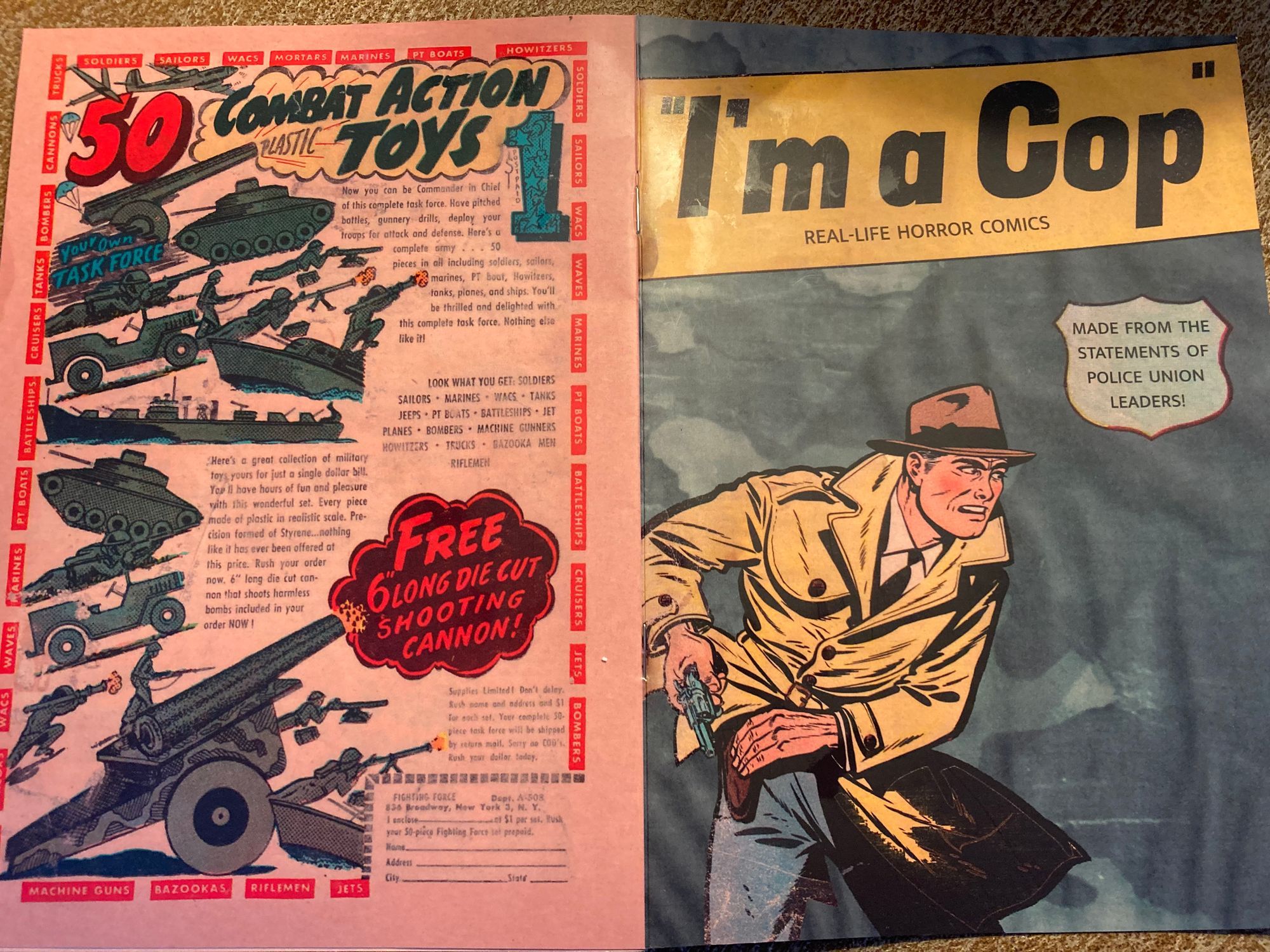
Today's newsletter is about – you guessed it! – the fucking cops. It's an interview with author and comics artist Johnny Damm about his new comic I'm a Cop which combines public statements from police union leaders around the country with a 1950s era horror comic style. As he explains it the comic "showcases the ghoulish psychology of policing and challenges readers to see the real-life horror in what the police have been telling us all along." You can buy it or any of his other work here.
1) The police want us to be afraid. This justifies their existence and excuses their violence.
— Johnny Damm (@dammjohnny) September 25, 2022
The text in this comic is from the Twitter account of the New York City Sergeants Benevolent Association. pic.twitter.com/ktlTLvrIoc
The other day I sent out one of the stream of consciousness maudlin literary style pieces that I haven't done in a while (because I was putting all that type of writing into the upcoming book) but now I'm back on my bullshit. So if you like the ones where it's like "is this guy ok?" you should pay to subscribe and read it please and thank you. Readers seemed to really like it! "The last line of this nearly broke me on my lunch break," one said. "Whew buddy. 'One of the good ones' as we long-timers say," said another. "Not sure why but I loved this one, but I really did. Really did. Sort of why I like Ornette Coleman or Coltrane when they are on a wildly discordant trip," said a third. "One of your best," said one more.
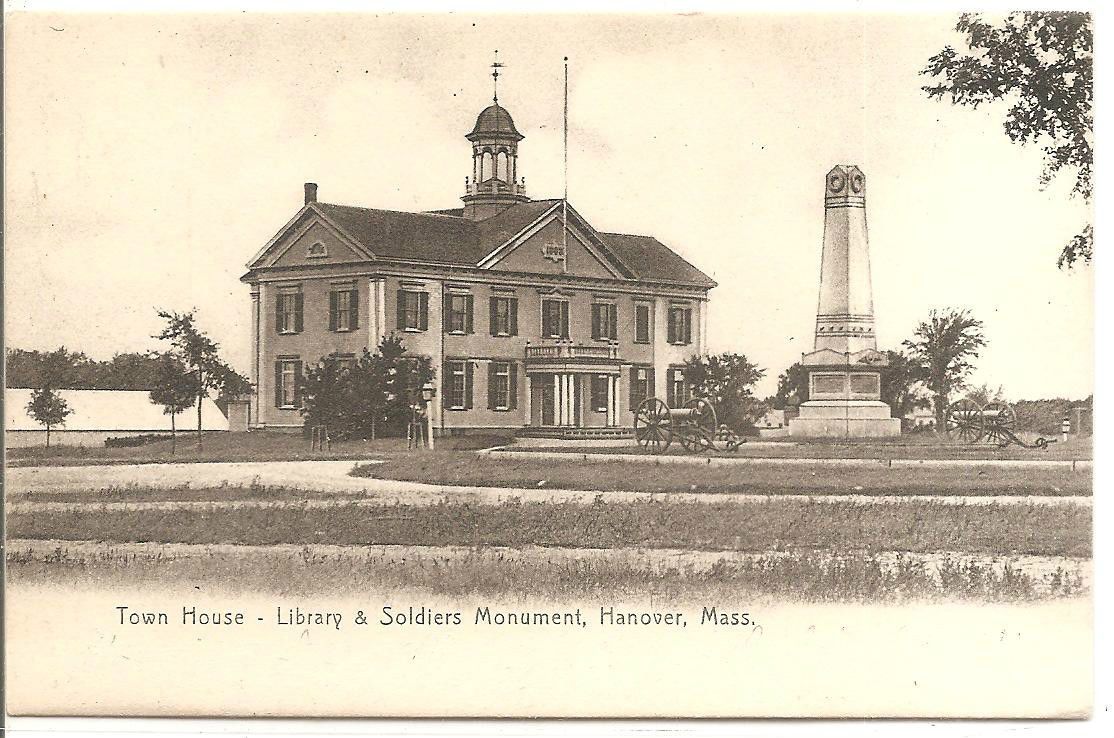
Sort of weird to post testimonials about your newsletter in your own newsletter (?) but paid subs are down and I gotta grease the gears here somehow I don't know what to tell you buddy.
Real quick and because we mention this sort of thing below check this story out.
Cops are stopping black men in the jetbridge when they’re almost on the plane and searching their stuff for drugs and cash https://t.co/FsqyfbPmt6
— josie duffy rice (@jduffyrice) October 11, 2022
This all sucks but don't overlook the part about the cash seizures which are such a huge part of the cop-on-civilian crime wave in this country. Only 8 of the 25 people got "much of" their money back. Pretty good deal for the cops who stole it.
Police records show that from Aug. 30, 2020, to April 30, 2021, there were 402 jet bridge stops, and the passenger’s race was listed for 378 of those stops. Of those 378 passengers, 211, or 56%, were Black, and people of color accounted for 258 total stops, or 68%, the lawsuit says.
Those 402 stops resulted in three reported drug seizures: about 10 grams of drugs from one passenger, 26 grams of “suspected THC gummies” from another, and six prescription pills without a prescription from a third, the lawsuit says. Only the first and third person were charged.
Those 402 stops also yielded more than $1 million in cash and money orders from a total of 25 passengers. All but one were allowed to continue their travels, and only two — the ones who also had drugs — were charged, the lawsuit says. Eight of the 25 challenged the seizures, and Clayton County police settled each case, returning much of the seized money, the lawsuit says.
Ok now here's me and Damm.
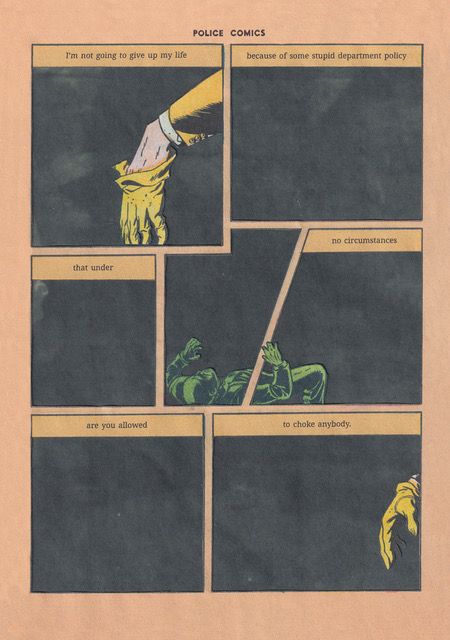
What was the origin of this idea? I know you’ve done a couple of books with a similar sort of found material juxtaposition concept before, but how did the idea of pairing statements from police union leaders with an old horror comic aesthetic come to you?
I’ve been doing work like this for quite a while, where I use texts that I find through my research and make comics out of. I started this one in 2020. During the uprisings and the whole sort of conversation about policing I did think the one thing people were perhaps not listening to enough were the cops themselves. Like really hearing them. When people argued if policing can be reformed, I thought, well, listen to the cops. What do you think they’re saying? So part of my inclination was how I can get people to pay attention to what the police unions, in particular, are saying, as sort of the mouthpieces of policing. I began keeping files. Lots and lots of files of things that people said. When I tried to figure out how to make it into a comic it occurred to me that everything that police unions say about policing uses straight up horror rhetoric. They talk about themselves, the world, as horror.
Wolves and sheep and all that.
Yeah. One of the things that really struck me early on in the project is that the National Fraternal Order of Police has retweeted the same tweet once every week or two weeks since September of 2020. It says “We are the thin blue line. The only thing standing between order and anarchy. We protect the prey from the predators, the good from the bad.”
We are the #ThinBlueLine—the only thing standing between Order and Anarchy. We protect the prey from the predators, the good from the bad.
— National Fraternal Order of Police (FOP) (@GLFOP) September 15, 2020
It’s Time for All Americans to #DefendOurPolice pic.twitter.com/GrgX1YYTTX
It’s scary, but it’s also so purple and melodramatic, the way they always talk. They do often sort of sound like a hard-boiled comic character.
Exactly. And at the time the original horror comics were coming out another really popular comics genre was crime comics. Copaganda with the focus of criminals as monsters was really iconic. The name of my comic, I’m a Cop, is taken from an old crime comic that was made, they claim on the cover, with the participation of the New York City Police Department.
What era was that, the 50s?
Crime comics from 1948 to 1954, which is the same era as horror comics. So the idea is they’re using the horror rhetoric, you show the horror rhetoric, but then you also see how they are their own incredibly horrific creation.
There’s something quintessentially horror and comic book about that. The mad scientist experimenting on himself and turning himself into a monster sort of thing.
Totally. There was one I cut out from the comic that depicted a mad scientist, I just couldn’t quite get it to work.
What is it you are trying to convey with the spareness of the art? There aren’t many words on the page. What was the effect you were going for there?
I often tell people that if they saw the full statements I’m working with it is so much worse.
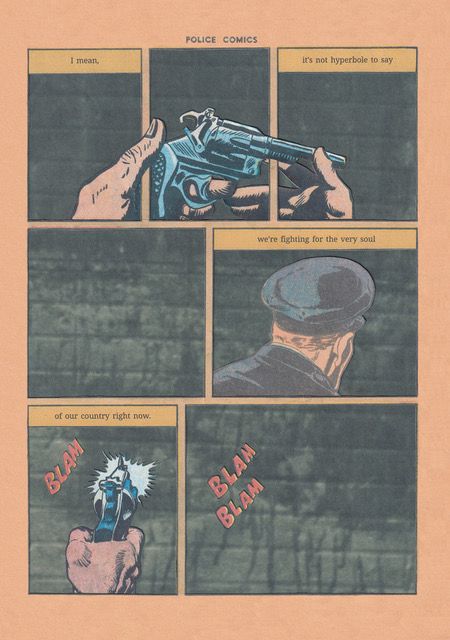
But it was a choice to boil it down right?
Yeah. I think part of it is its effect, its rhythm. I also come from a visual poetry background, so I was thinking about the rhythm of the words in a way, with the images and in particular the panel breaks. There was something I realized early on about getting the statements as short as possible that, if anything, it amped up the horrific effect. I think people usually [tune out when they hear cops talk]. Almost everything that I quote people could have read. A lot of it is from news articles. But why didn’t people really read it the first time? Why didn’t it sink in? Well, it’s surrounded by all this other stuff that makes us tune out. So to strip it absolutely down, pair it with these sort of weird, creepy images, that changes the effect, and hopefully people will really read it and think about it.
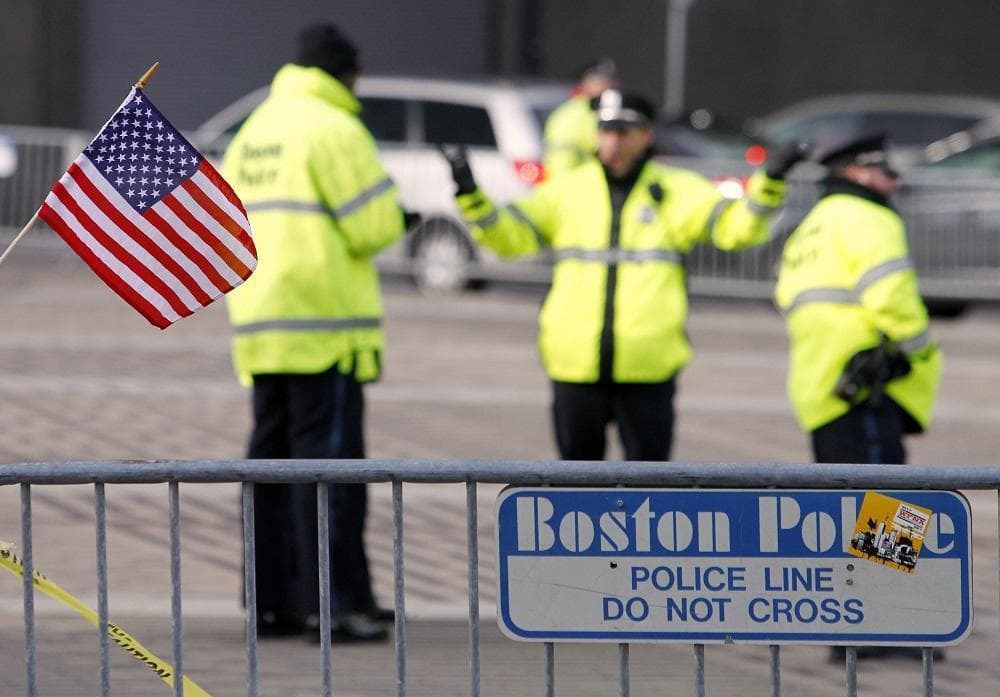
As bad as cops are, I don’t think the average person has any idea how unhinged these union leaders are. Patrick Lynch in New York City you quote in here a couple times. More so than that though is their newsletters. We had a scandal here in the Boston area with the Pax Centurion newsletter. Not sure you came across that one.
I had someone send me the archive. I hadn’t read them all the way through yet.
Some of the most blatantly offensive shit. Not that it’s surprising if you follow policing. Did you read newsletters like that?
I read the newsletters of the national organizations. I thought I was done, because frankly, by the time I finished this – and I boiled it down and made it a lot shorter than it originally was – I was like, I can’t do this anymore. I have to step away from this. I’ve stepped away for long enough now that I think I’ll return to it. I’ll probably start with the newsletters. I really like the idea of that because it’s cops talking to cops. But my focus here was primarily on their public statements. That they literally say these things for non-cops to tell us how we should think about policing. We know that violent crime is a tiny percentage of policing, but in terms of how they portray themselves, we’re all monsters, the whole world is filled with monsters. And all they do is go out every day and hunt monsters. Is it a coincidence then that they keep killing unarmed people? It’s the whole toxic mentality which is the basis of policing.
Did you see the one in San Antonio this week where the cop walked up to a kid eating in a McDonald’s parking lot, and he surprises the kid and tries to open the door and when he drives off he just unloads his gun on him. Out of nowhere. It wasn’t any sort of tense situation, not to give them the benefit of the doubt for those, but there wasn’t even a pretense they could retrofit. It’s always interesting to see the ones, if you ever read cop posting pages, where there are killings where even cops are like, ok, this dude fucked up.
Right. They’ll say they fucked up, but it comes from a place of looking at us all as threats. Even though dealing with anything that even resembles a threat is a tiny percentage of their job. If this is how they are talking among themselves, how they view their work, and how they’ve been taught to view their work… This sort of binary of good/bad, monster/monster-killer is also a key ingredient of the US entertainment industry’s version of policing, so that’s all internalized.
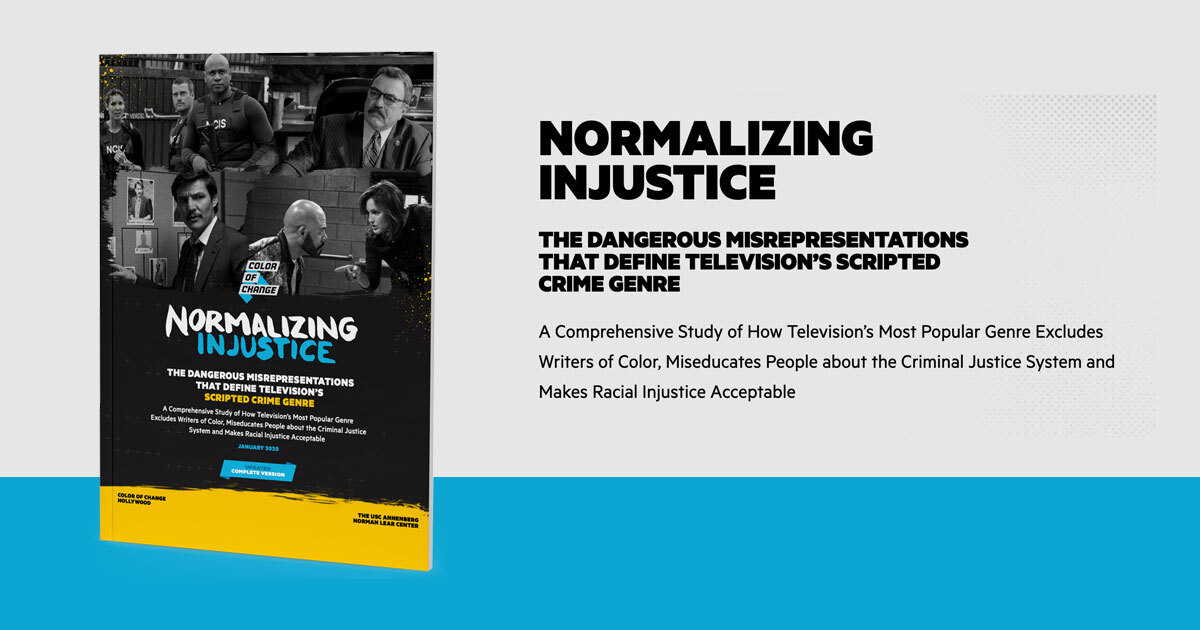
It’s been kind of funny seeing some cop shows try to deal with the change in awareness in the past couple years. Have you watched any cop shows in a while?
I haven’t. Cop shows are still the vast majority of broadcast television, which I don’t really watch. But I do know there was a shift. This organization Color of Change did a report in 2020 about how cop shows have changed. But their point was they’d changed in negative ways, because all portrayals of cops had become about cops being allowed to be outside the law because of the threat of monsters.
A lot of the quotes you pick out for the comic highlight this cop-brain idea about the immutable nature of criminals and cops. A crime isn’t an action that someone does, and policing isn’t a job that someone works, these are somehow inherent to our fundamental identities. It’s basically like you’re born a cop, which ties into the whole Blue LIves Matter concept.
Police leaders repeatedly refer to nature. The fundamental nature of cops. There’s this really weird thing that some academics have written about, where they kind of refer to cops as being part of their own race. And also they’re marginalized.
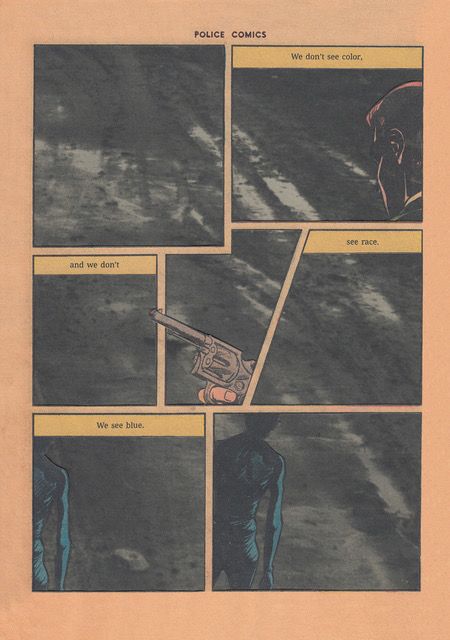
That’s the thing. They’re two things at once. The most powerful badass heroes out there, going from village to village with a sword to slay the monsters, but they’re also these put-upon little babies who are constantly being…
Victimized. I tried to capture that dichotomy a little bit. They will play both sides of that.
People believe that shit. The “back the blue” types with the flags up. They simultaneously believe that these are our big heroes but also that we’re treating them so unfairly.
I’d be curious to know how many people actually believe there was some sort of mass defunding of police in the country.
That’s a great question. Certainly the police unions, since 2020, definitely in the last year, they’ve been much more on point with their talking points. They talk about mass-defunding constantly, and suggest as a fundamental threat “rogue prosecutors” who are puppets of George Soros. That’s one of their lines they use all the time. The other one is the defund movement. They say even the mentioning of the word defund has caused mass crime waves. It’s a direct argument that they’re making nearly daily in the right wing news media.
I can’t remember the last time I saw a politician talk about defunding, if any of them ever did. Certainly not the president.
Another thing I liked in the book were the examples of this kind of cop crying that goes something like “Well you might not like us now, but wait until you see what happens when we’re not here.”
The Police Benevolent Association in New York, and Ed Mullins, who has since been charged with embezzlement from the union, was always saying stuff like that. He was always like, yeah, the minute we leave you’re going to suffer.
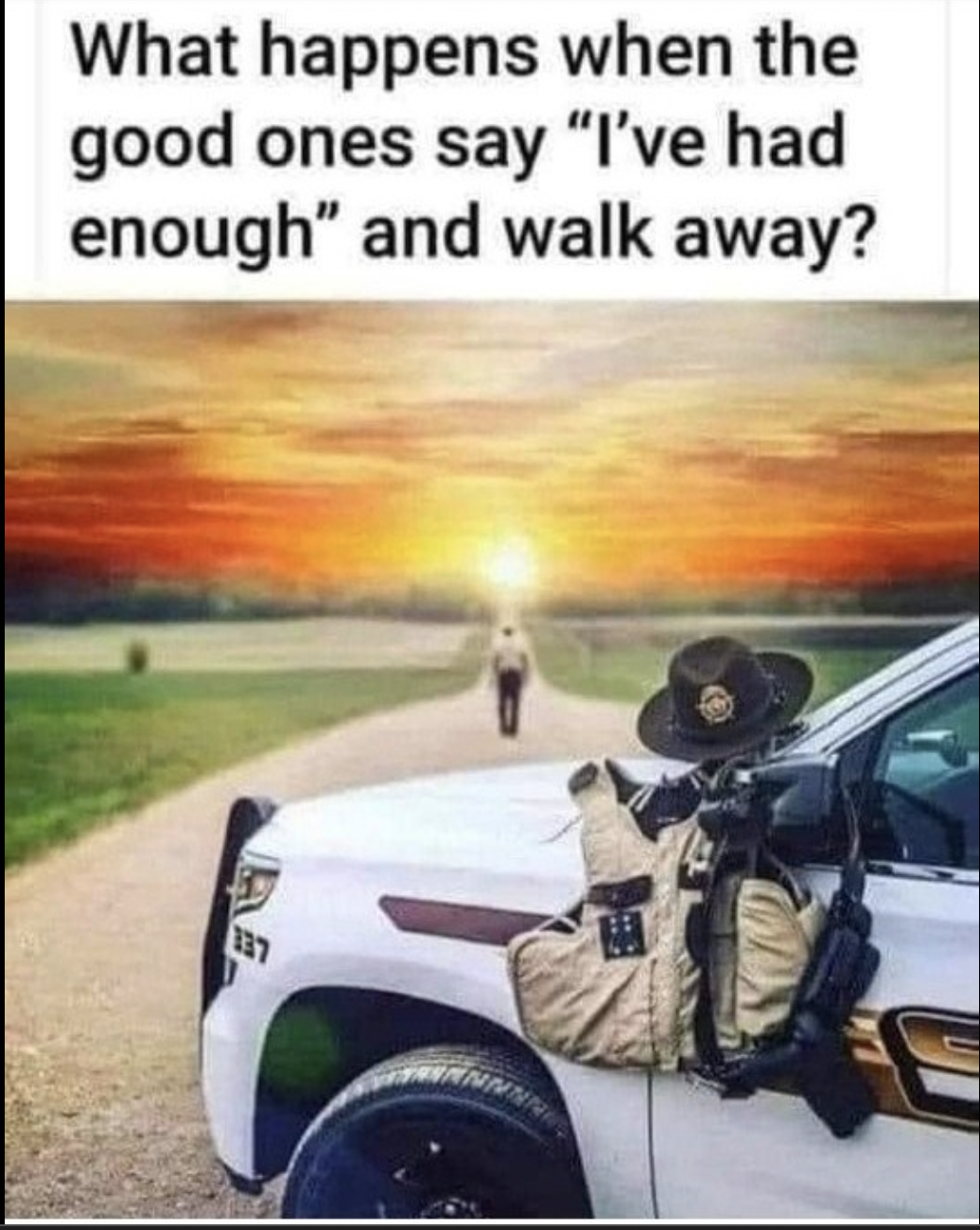
I saw some goofy meme shared this morning with a Florida cop walking away into the sunset, almost like he’s ascending to heaven or some shit. A friend of mine does a blog called All Cops are Posters that covers the way cops and the people who love them post online, and it’s often so goofy like that. It’s funny, but at the same time it’s like, uh, these are the people who can brutalize or kill us with near impunity, and this is how they think.
One of the biggest things to remember is that this version of policing we have now has only been around since the 90s. They talk about policing as this immutable thing. But policing itself does not have deep roots. Certainly the mass militarization of police began with Bill Clinton.
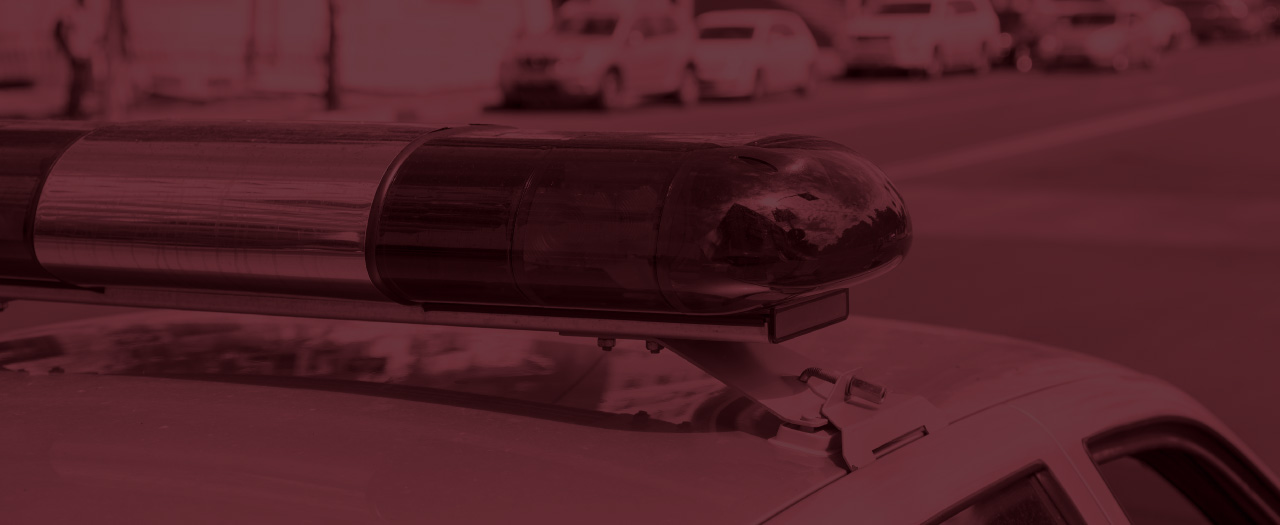
The first police department was like 150 years ago or something.
Which is wild. Because they're like it’s always been like this, and without us it’s pure chaos. [LAPD union head] Jamie McBride, the amount of times he’s said Los Angeles is like the movie the Purge. He repeated that over and over again. He loved it. And clearly it was getting a response. The people interviewing him loved it. And then he tried to say LA was like the Walking Dead.
The other part of that is he also said we can’t protect you.
So what the fuck are you there for?
The reason he said they can’t protect us is because they’re being held back by even the possibility of reform. And reform is a nonsensical term. But the possibility of any funding being taken away or any restriction on what they're allowed to do… He would say it was the rogue prosecutor in LA who is making it this way. We’re not allowed to do everything we want, and because of that we can’t protect you. And the whole world is monsters and if you go look outside your door there’s a huge crimewave.
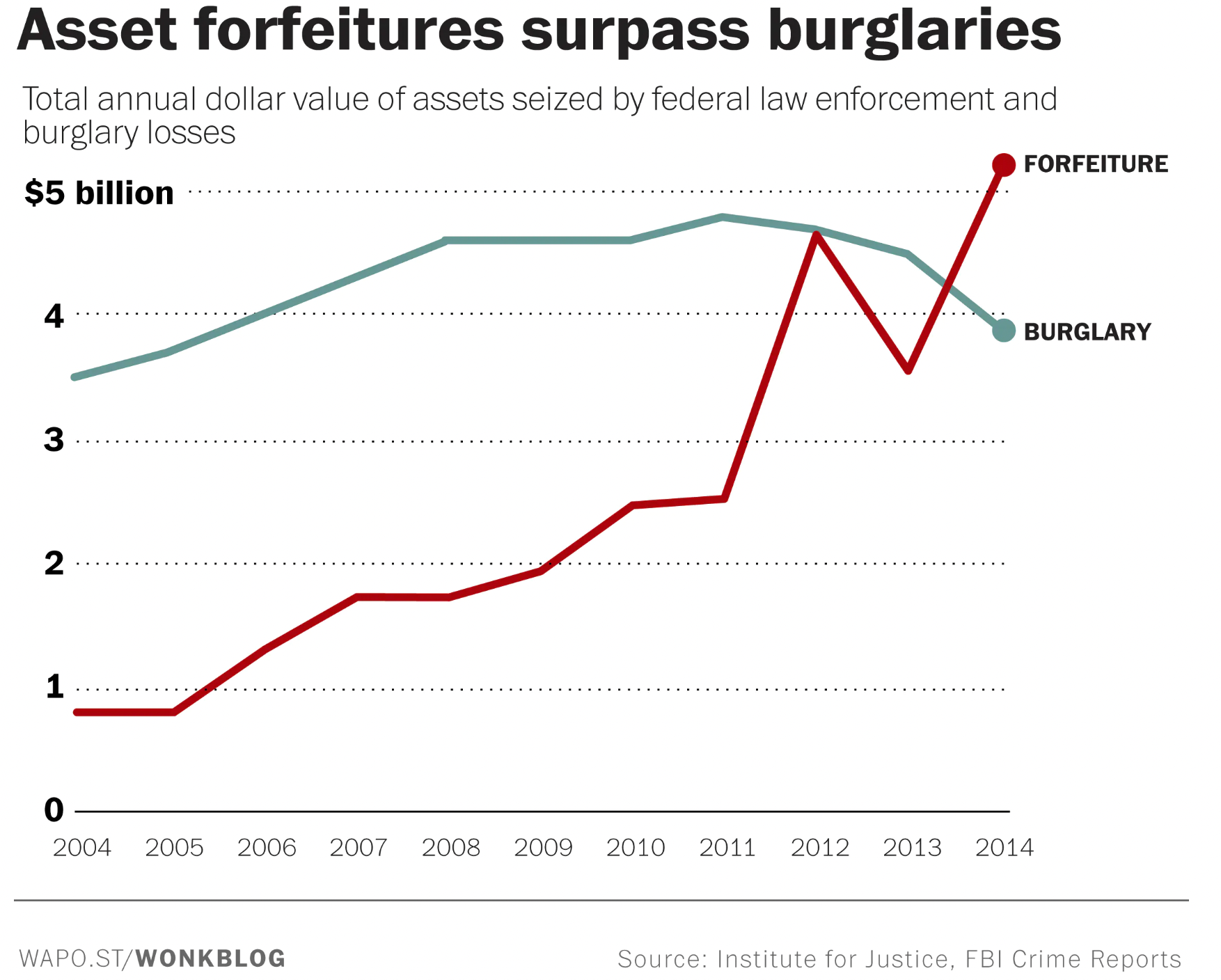
Meanwhile when we talk about crime it doesn’t take into account the number of people that police themselves abuse, the amount of money they steal through asset forfeiture...
The weaponization of the term crime and the term criminal is a whole other conversation….
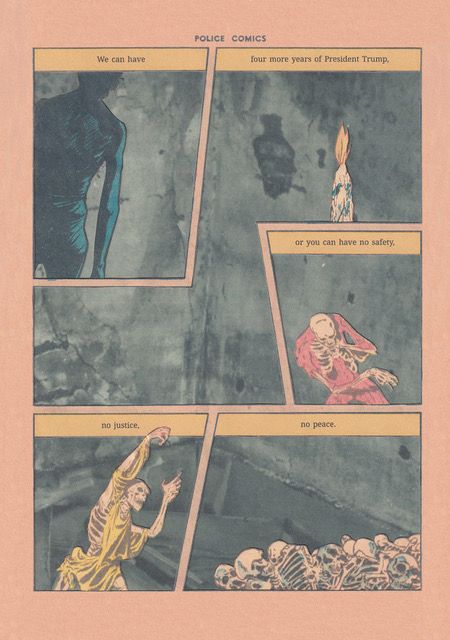
So is there one that really stands out in the comic that you like?
Patrick Lynch was talking at the Republican National Convention, and he said if you don’t elect Trump you’ll have “no safety, no justice, no peace.” The fact that he chose to echo and co-opt the language of the protests… Then the police union did that repeatedly when talking about police victimization. Mike O’Meara [also of the NYPD union] said “We’re being treated like thugs.” Basically saying “we’re being treated like black people.” Lines like that still give me chills. It’s so blatant. And it just shows a really deeply disturbing mentality. If I’m making a point with I’m a Cop it’s that you can’t reform this. There’s no basis here for something that can be reformed. So this just has to go.



